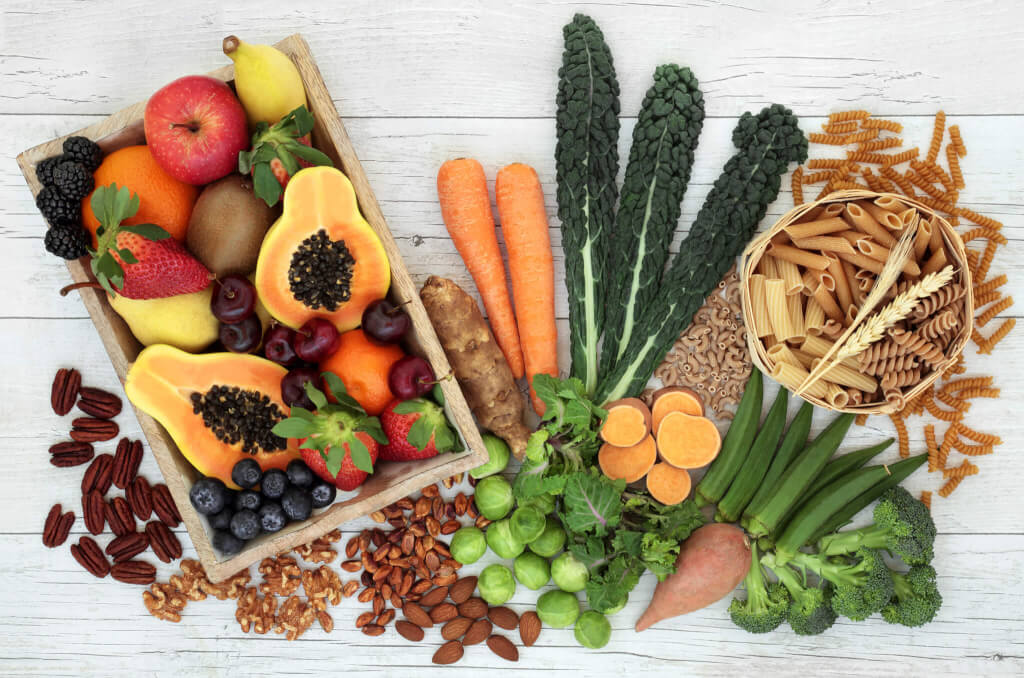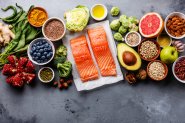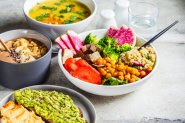Advertising Disclosure
Best Probiotic Foods for Your Microbiome

Do you want to improve the health of your microbiome? Then add fermented foods to your diet. Yogurt may be the most well known option, but it certainly isn’t the only one. In this article, we’ll talk about the best probiotic foods that will boost your gut microbiome. It’s time to add some live bacteria to your diet!
Why probiotic foods?
Why are probiotics so important for our microbiota? Because they promote health. Probiotics, also known as ‘friendly bacteria’, eat sugar and help build our immune system. In addition, good bacteria improve the absorption of food nutrients. And they of course helps with digestion.
Now, there are ‘mean’ bacteria in our microbiome as well. These bacteria disrupt health. So we must have enough of the ‘friendly bacteria’ to keep the ‘mean’ bacteria in line. We do this by consuming fermented foods and certain types of fruits, veggies, legumes, and nuts.
Now you know why probiotics are important. Let’s see which probiotic foods are best for your gut.
6 Probiotic Foods to Add to Your Diet
1.Yogurt

One of the most popular probiotic foods, yogurt, is a great addition to breakfast, lunch or dinner. This fermented food contains good bacteria that calms gut microbiota and helps maintain its balance.
Thanks to a lovely thick texture and lots of protein, it will help you feel full much faster. And you’ll stay full for longer. This is great for weight management.
Additionally, yogurt contains vitamin B-2 and B-12 which are believed to decrease the risk of heart disease. Yogurt also contains calcium that protects your bones, plus magnesium and potassium that regulate blood pressure and metabolism. (1)
2.Kefir

With a consistency thinner than yogurt and a larger group of microorganisms, kefir is great addition to your diet. Try mixing it with risotto, salads, or oats. Compared to yogurt, Kefir contains different strains of ‘good’ bacteria – Leuconostoc, Lactobacillus Caucasus, Streptococcus species, and Acetobacter species. It also has a good amount of protein.
Moreover, it contains yeasts that eliminate damaging yeasts in your body. Research also suggests that this fermented drink protects against bacteria and improves bone health.
To conclude, kefir is ‘a vitamin and nutrient bomb’.
3.Kimchi

A cabbage dish seasoned with spices, garlic, and hot peppers, kimchi is widely popular in Asia. The ingredients are fermented in a jar, which creates the good bacteria.
Additionally, kimchi contains antioxidants, as well as the valuable trace mineral selenium. It’s low in calories. Plus it boosts immunity, lowers cholesterol, helps people to lose weight, and slows down aging.
If you’ve never tried kimchi, here are some recipes to wet your appetite. From kimchi stew to kimchi pancakes, we’re sure you’ll find something delicious.
4.Sauerkraut

This fermented cabbage is definitely one of the best probiotic foods to add to your diet. It contains live bacteria that are known to ease problems with digestion.
Also, sauerkraut contains enzymes so your body will absorb the nutrients more easily.
There’s one thing to keep in mind though – this food has a high level of sodium. So, eat this one in moderation.
5.Kombucha

Kombucha is a green or black tea that is high in ‘good’ bacteria and yeast. During the fermentation, sugar turns into alcohol so this drink does contain a small amount of alcohol.
As for the health benefits, this beverage contains antioxidants, probiotics, and B vitamins. Due to its popularity, there are many different brands. So we advise you to always check the nutritional label and especially be wary of sugar content.
Nutrition experts recommend a slow start when it comes to drinking kombucha – a maximum of 4 oz. per day. Also, check with your doctor as kombucha causes some to have strong side effects. And if you’re pregnant, don’t drink kombucha.
6. Miso

Miso is another dish popular in Asian cuisine. It’s a paste made from fermented soybeans. It contains a large number of good bacteria and is packed with protein.
It has B vitamins, folic acid, vitamin E and vitamin K. You can see why Japanese and Chinese people consume miso on a daily basis.
There are different types of miso – white, yellow, red and barley miso. Find your perfect match.
A Final Word
Combine the best probiotic foods with a healthy diet to make your gut resilient and balanced. When your gut microbiome is strong, it can fight bad bacteria and infections, boost your immune system, decrease stress levels, help you manage a healthy weight and much more! Add some of these probiotic foods to your diet today!





